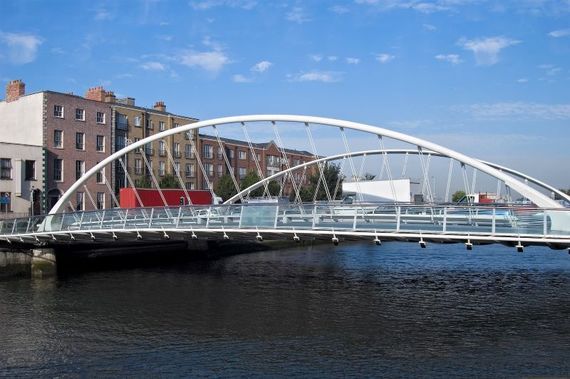There is a plan to turn the real-life Dublin house that James Joyce set his classic story "The Dead" into, of all things, a budget youth hostel.
Arguably the finest short story of the 20th century, James Joyce's "The Dead" has become a cornice stone of Irish literature, a work so important, so foundational to our understanding of ourselves, that you can not sufficiently express it.
So when plans were announced at the weekend to turn the real-life Dublin house where the story is set into a 56-bed budget hostel critics fumed it would be an act of cultural vandalism like building a motorway over Newgrange or turning the Hill of Tara into a car park.
Read more: James Joyce and “The Dead” in the time of Trump

Noted Joyce scholar Professor John McCourt has been at the head of a campaign to highlight the hostel's planning application to Dublin City Council and hopefully reverse course on the plans for 15 Ushers Island before it's too late.
Offering a clear-eyed view of the building's current condition he's also conscious of its larger import to Irish literature: “I was aware of the poor condition of the house for the last couple of years because I knew the previous owner had tried to run it as a cultural center and essentially had lost his shirt and got very little help, certainly no institutional help, and very little help from anybody else.”
What McCourt calls 'The Dead house' has been deteriorating for decades and throughout that time many people have called on the government to step in or for Dublin Corporation to get involved to no avail.
“When the suggestion came up recently of bringing Joyce's remains home from Zurich to Dublin I said a far better way of commemorating him would be to invest in 'The Dead' house which is at risk,” McCourt says.

But just one week after McCourt's original suggestion was published the planning application for the budget hostel was quietly announced. The application gives away very little detail of what's coming except to say that the applicants want to build a "56-bed hostel inside of the original 15 Ushers Island structure.”
If there is one thing Dublin is not short of, it's hotel- and hostel accommodation McCourt, who is Professor of English Literature at the University of Macerata, tells IrishCentral. “Obviously Dublin needs new housing but it doesn't need another hostel,” he continues.
Before he and others put together a petition letter against the plan, which was quickly signed by over 100 prominent Irish writers and academics, they gave the Irish Minister for Culture, Heritage and the Gaeltacht Josepha Madigan an opportunity to make her views known first.
“We gave Minister Madigan a chance to articulate a response first. She didn't respond at all. So then we published the letter and sent it to her. Eventually, she issued a statement through her spokesperson, which just dismissed the thing and said she didn't have the powers to intervene.”
Later that same evening Madigan tweeted that she would like to get involved but couldn't. So McCourt wrote a follow up to her private email. Again there was no response. “It seems she just doesn't want to get into a conversation about it,” he says. But there should be a conversation around this building, McCourt contends.
Read more: Talks to have James Joyce’s remains returned to Ireland
“Perhaps there is one going on in private that I know nothing about. The minister claims that it's a protected structure, but we all know what happens to protected structures when the builders go in. Walls collapse and they say it couldn't be helped. The fear is that they will change its shape so that we'll be left with the facade and plaque and nothing more.”
You simply can't overstate the importance of "The Dead" and Joyce's achievement, McCourt continues. “In a way, it's a story in which he makes his peace with Dublin I think because it begins to be some kind of a reconciliation story and a celebration of the city. It's a story that pays homage to his own family connections with that building. It's an astonishingly powerful short story, I think we can all agree, probably the best short story of the 20th century in the Irish or any other traditions.”
"The Dead," says an awful lot about Ireland of his time and also of the West. It's a story which Joyce somewhat immerses himself in the stories of Irish Revival because he deals with all of that material, of going West, of Miss Ivers (the fiery nationalist) and he occupies all that space in a very real way.
“So it's a story about identity and it's a story about how we come to terms with the past. This idea of a young man who died of love for Greta Conroy is of course in a way a statement of the whole idea of dying for Ireland if you like, that whole tradition that Joyce was interrogating. So it's a ghost story and it's a story that I think still kind of haunts us today. And that's why we keep going back to it, partly because it's told at Christmas and it very much celebrates that kind of Christmas tradition.”
"The fact that Joyce located the story so precisely in the space at 15 Ushers Island (you can still see the spaces in the house that inspired him) for lovers of literature around the world, whether the Irish government wants to recognize it or not, makes it a place of homage and pilgrimage.”
For most Joyce readers "Dubliners" and "The Dead" also represent Joyce at his most approachable, McCourt contends. “Most people are not going to drag themselves through 'Ulysses' or 'Finnegans Wake' to be fair. But an awful lot of people will have dipped into 'The Dead' and found something very special there.”
Now the campaign to stop the hostel project is starting to make headlines around the world, with most slack-jawed in disbelief that a building so central to Joyce's art could face such a fate.

But McCourt is not surprised. “The Irish papers are not very keen to run with the story at all,” he says. "The Irish Independent hasn't printed as much as the word on it, which suggests a certain amount of interests or connection with the developers rather than with our culture.”
Joyce gained his reputation abroad and it was because that reputation was so powerful abroad that he was somewhat begrudgingly recognized belatedly at home, McCourt says.
“So I think once again Ireland is in a sense failing him by failing to recognize this building. It's not just another Joyce building. This in a way is the heart of his Dublin and what he wanted to question and celebrate about the city. Joyceans around the world are shocked now. Any other city in the world would want to preserve it. Because Joyce has name recognition like no other Irish person. He and Dublin go together, they're synonymous.”
The petition to preserve 15 Usher's Island, Joyce's House of The Dead has been signed by 1000 people! This adds a little clout to the campaign. A further 1000 would greatly bolster the argument in favour of saving this historic site. Please retweet and ask friends to sign + share https://t.co/pkxGO09UoQ
— John McCourt (@mccourtitaly) November 18, 2019
Some observers are saying that 15 Ushers Island is simply too far out of town, but that's a very limited way of looking at the city McCourt says. “It's 20 minutes from O'Connell Street. It's on the way to the Guinness Brewery. I certainly think we could carve out a space for him.”
To do so isn't simply a heritage question, it's also business savvy McCourt says. “We should invest in things that make people abroad love the country. We kind of take it for granted that people will continue to want to come to a city is losing so many of its heritage sites.
“O'Casey's birthplace is about to be pulled down, Moore Street is in danger again. People could visit soon and just see a blue plaque on an anonymous modern building. It's very sad.”
On walking tours around Dublin with fellow Joyceans it's become almost embarrassing now he says because they're being brought to places that have long since disappeared.
“You say this is where the house in Ulysses was, or the hotel in Dubliners, or the pub. Some of that is inevitable progress, I understand. But I do think the house of The Dead is iconic. That story is an elegy and we are still trying to tease out its meaning. We have to protect it.”




Comments